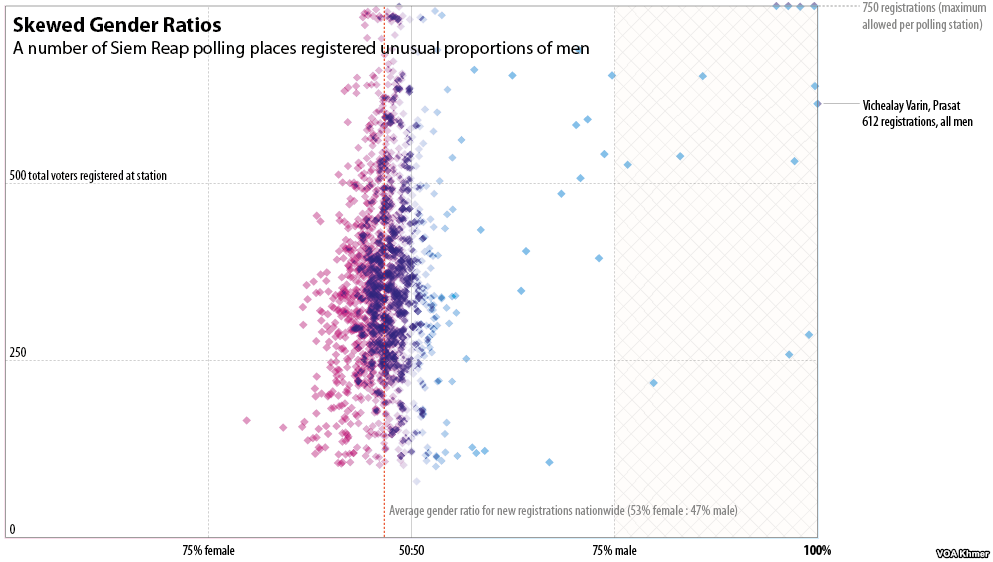Summary:
Guest post by Jeff Mosenkis of Innovations for Poverty Action. Detecting soldiers registering as new voters in Cambodia from the gender distribution. Take a few minutes to read the latest newsletter from the CSWEP, the AEA’s Committee on the Status of Women in the Economics Profession. In particular, the opening harrowing account from economist and law professor Jennifer Bennett Shinall on being sexually assaulted by a more senior colleague on an airplane, and on page 5, the anonymous descriptions from CSWEP members that document the range of everyday harassment that women in the field experience. Lest you think it’s only a problem of junior faculty, read this encounter Sue Dynarski had with a faculty member when she was giving a named lecture. On a much more inspiring note is this
Topics:
Jeff Mosenkis (IPA) considers the following as important: academia, Cambodia, development, Economics, elections, gender, links, miscellany, news, podcast, podcasts, Research, teaching, women
This could be interesting, too:
Guest post by Jeff Mosenkis of Innovations for Poverty Action. Detecting soldiers registering as new voters in Cambodia from the gender distribution. Take a few minutes to read the latest newsletter from the CSWEP, the AEA’s Committee on the Status of Women in the Economics Profession. In particular, the opening harrowing account from economist and law professor Jennifer Bennett Shinall on being sexually assaulted by a more senior colleague on an airplane, and on page 5, the anonymous descriptions from CSWEP members that document the range of everyday harassment that women in the field experience. Lest you think it’s only a problem of junior faculty, read this encounter Sue Dynarski had with a faculty member when she was giving a named lecture. On a much more inspiring note is this
Topics:
Jeff Mosenkis (IPA) considers the following as important: academia, Cambodia, development, Economics, elections, gender, links, miscellany, news, podcast, podcasts, Research, teaching, women
This could be interesting, too:
Lars Pålsson Syll writes Schuldenbremse bye bye
Lars Pålsson Syll writes What’s wrong with economics — a primer
Lars Pålsson Syll writes Krigskeynesianismens återkomst
Lars Pålsson Syll writes Finding Eigenvalues and Eigenvectors (student stuff)
Guest post by Jeff Mosenkis of Innovations for Poverty Action.

Detecting soldiers registering as new voters in Cambodia from the gender distribution.
- Take a few minutes to read the latest newsletter from the CSWEP, the AEA’s Committee on the Status of Women in the Economics Profession. In particular, the opening harrowing account from economist and law professor Jennifer Bennett Shinall on being sexually assaulted by a more senior colleague on an airplane, and on page 5, the anonymous descriptions from CSWEP members that document the range of everyday harassment that women in the field experience.
- Lest you think it’s only a problem of junior faculty, read this encounter Sue Dynarski had with a faculty member when she was giving a named lecture.
- On a much more inspiring note is this series of three short but great podcasts from the St. Louis Fed on women in economics. They’re with Mary Daly, who went from high school dropout to research director at the Federal Reserve Bank of San Francisco; Ellen Zentner, chief economist at Morgan Stanley; and Claudia Sahm, of the Federal Reserve Board of Governors.
- Some takeaways: Each had a figure who got them really excited about economics, usually a teacher at a small school (if you’re ever down on teaching, think about the potentially great future contributors in the class).
- Claudia Sahm (I believe), pointed out that she didn’t want the recent public talk of sexual harassment in the field to have the paradoxical effect of discouraging women from choosing the field.
- Another takeaway was that to address the numbers of women in the field, you have to address the pipeline of women choosing the field and then not attriting along the way. For them, mentorship played an important role.
- A similar point about the corporate world came up in the very good Freakonomics episode about the Glass Cliff, the phenomenon of women being chosen as CEOs once a company is already in trouble, making it more likely they’ll be blamed for the company’s failure. Ellen Bartz, former CEO of Yahoo, and Indra Nooyi, PepsiCo CEO point out at the end, that you can lament about lack of women CEOs, but that you won’t get women CEOs without women as Senior Vice Presidents to choose from, and so on, back down the line.
- Another great conversation was Ezra Klein talking with Melinda Gates (Apple, RSS) about lots of great stuff (including the pipeline of women going into tech and STEM fields). She goes into a lot of great things she sees from her vantage point coming for global poverty and development, but Klein thankfully starts off with the hard-hitting question we all wanted to know: Where did Comic Sans come from?
- Above, in advance of elections Cambodia sends soldiers out to different regions to register as voters there and boost the ruling party’s votes. It’s detectable statistically by the timing of new voter registrations and gender skew among registered voters. (via Hannes Hemker)
- The Millennium Villages retrospective (non-randomized) endline evaluation is out.
- Texas maternal mortality statistics were improperly skewed by a bad drop-down menu design.
